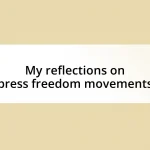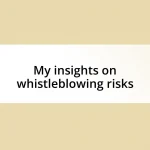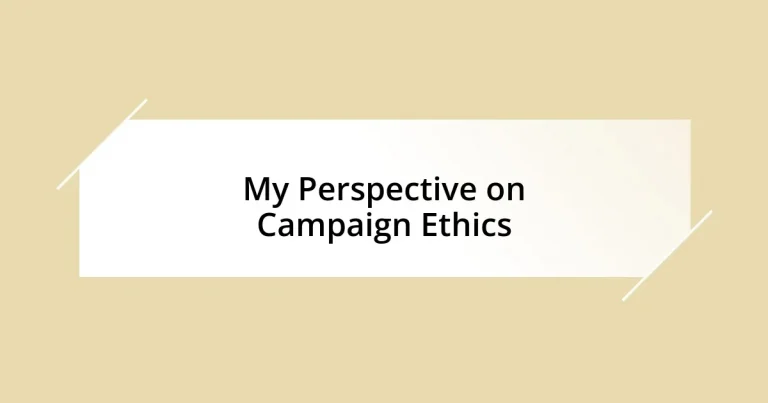Key takeaways:
- Maintaining campaign ethics is crucial for building voter trust and long-term relationships, as unethical practices can lead to irreparable damage to a campaign’s reputation.
- Key principles of campaign ethics include transparency, honesty, respect for opponents, accountability, and fairness, which all contribute to fostering meaningful connections with constituents.
- Real-life examples highlight the positive impact of ethical decision-making, such as choosing to avoid negative advertising and engaging transparently with voters amid misinformation.
- The future of campaign ethics will be shaped by technological advancements and increased scrutiny from the public, necessitating a strong commitment to ethical principles in campaigning.
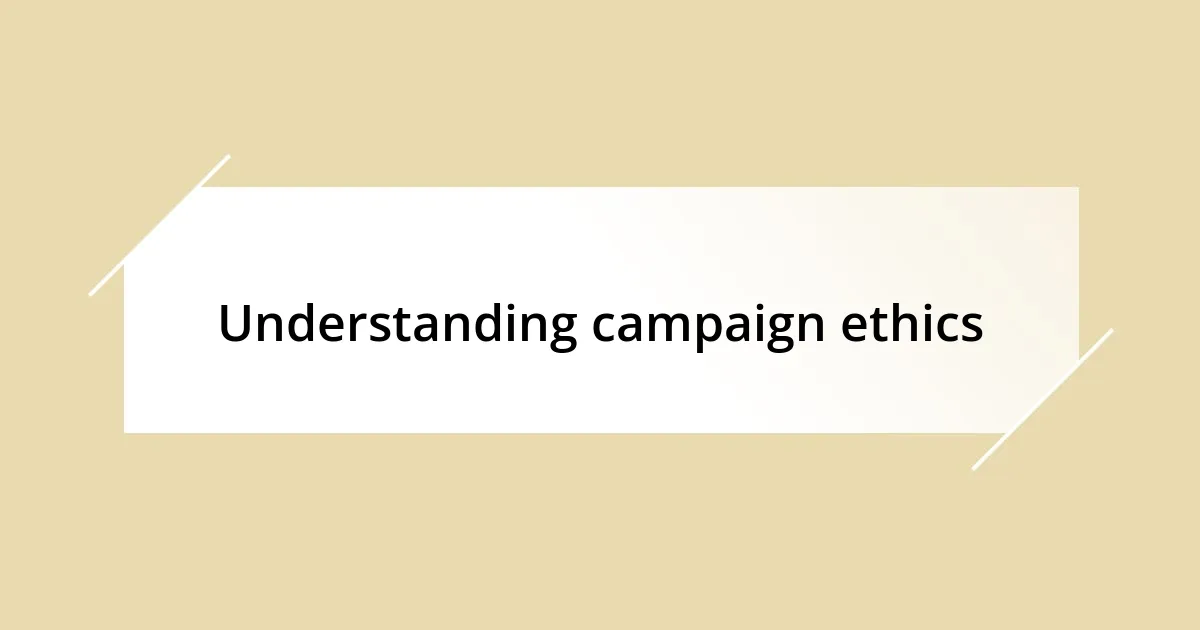
Understanding campaign ethics
Campaign ethics revolves around the principles that guide how political campaigns operate, ensuring transparency, accountability, and fairness. I often reflect on my experiences volunteering for a local candidate, where I witnessed firsthand the challenges of maintaining these ethical standards. Was it really worth compromising integrity for a few extra votes? I realized that trust is the cornerstone of effective campaigning, and when that trust is compromised, it can have lasting repercussions.
Navigating the gray areas of campaign ethics can sometimes feel like walking a tightrope. I remember a time when our campaign team faced a difficult decision about attacking an opponent’s record. While some argued it could sway public opinion, I felt an ethical responsibility to focus on our candidate’s vision instead. That moment made me question: shouldn’t we elevate the conversation rather than drag it down?
Understanding campaign ethics is not just an academic exercise; it’s about the real impact our choices have on democracy. I often think about how the public perceives the integrity of a campaign. When ethical lapses occur, voters may disengage altogether, feeling disillusioned with the entire political process. It’s a powerful reminder that our actions in campaigns shape not only the outcome of elections but the very foundation of public trust in our political systems.
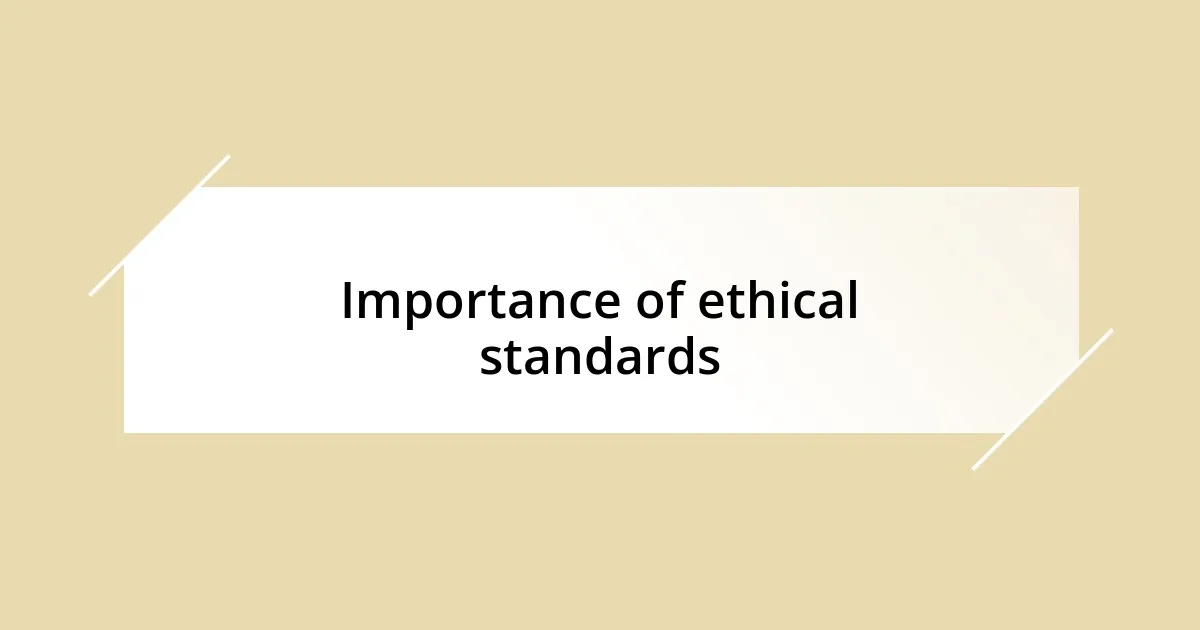
Importance of ethical standards
The significance of ethical standards in campaigns cannot be overstated. When I was involved in a grassroots campaign, I saw how adhering to these principles transformed our interactions with voters. We were rewarded with genuine support because people appreciated our honesty. I’ve learned that ethical conduct fosters a deeper connection with the community; constituents are more likely to engage when they believe they’re being treated with respect and integrity.
Moreover, ethical standards can serve as a guiding compass during tumultuous times in a campaign. I recall a heated moment when misinformation threatened to overshadow our message. Instead of retaliating, we took a step back and focused on clarity and truth. This choice was not just about winning; it was about standing up for what was right. In those instances, staying true to ethical guidelines became a measure of our values as a campaign and reinforced my belief that integrity must triumph over expediency.
Ultimately, maintaining ethical standards shapes the larger narrative of who we are as candidates and representatives. I found that engaging honestly with voters not only built trust but also galvanized our supporters. It became clear to me that a reputation rooted in ethics can create lasting change, strengthening the fabric of our democratic process. Ethics in campaigning isn’t merely a guideline; it is the very foundation on which enduring political relationships are built.
| Aspect | Ethical Campaign | Unethical Campaign |
|---|---|---|
| Voter Trust | High | Low |
| Long-term Relationships | Strong | Weak |
| Campaign Reputation | Positive | Negative |
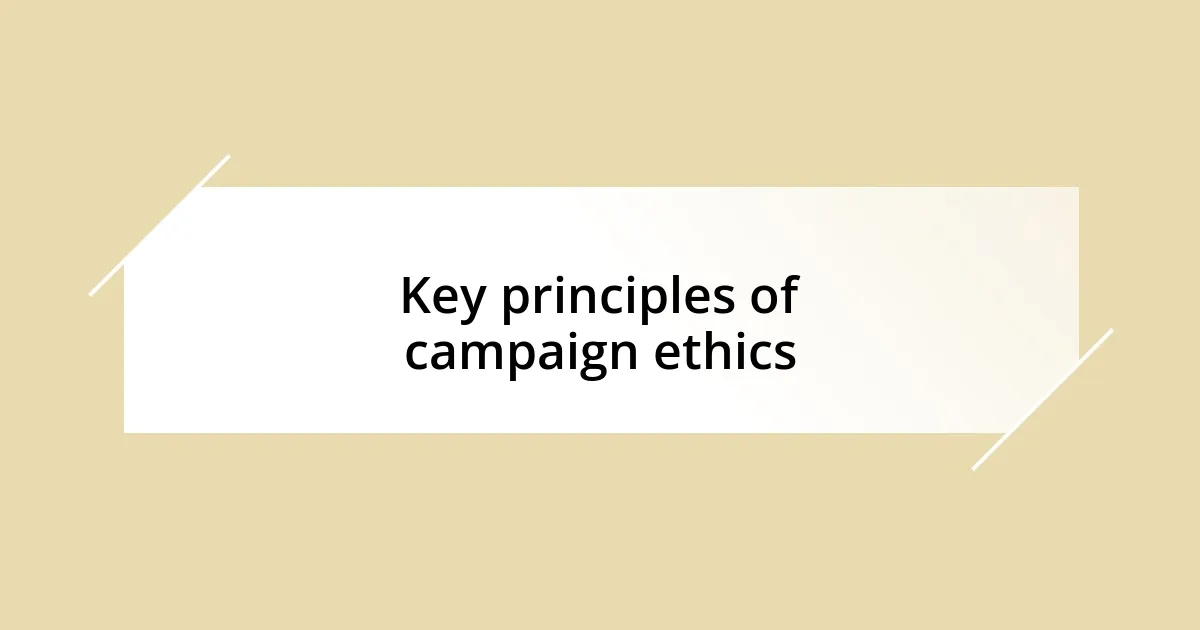
Key principles of campaign ethics
While delving into the key principles of campaign ethics, I can’t help but emphasize the importance of honesty. In one of my early campaigns, we faced the daunting task of addressing controversial issues. Instead of glossing over them, we chose to confront them with transparency. This decision not only strengthened our bond with the voters but also reinforced my belief that honesty is vital in fostering trust. When the electorate sees a candidate genuinely addressing their concerns, it creates a lasting connection.
Here are some essential principles of campaign ethics that I believe should guide every political endeavor:
- Transparency: Always disclose relevant information to the public. Transparency fosters trust and accountability.
- Honesty: Ensure that all communication, whether in advertisements or speeches, is truthful. Misinformation erodes public confidence.
- Respect for Opponents: Engage with opponents constructively and avoid personal attacks. A respectful campaign encourages civil discourse and improves the political climate.
- Accountability: Be ready to take responsibility for decisions and actions. Owning up to mistakes can enhance credibility and strengthen relationships with voters.
- Fairness: Strive for equal opportunities for all candidates, creating a level playing field for competition. Fairness is essential in maintaining the integrity of the election process.
Reflecting on these principles, I can recall moments when our team made the tough choice to remain above reproach. There was an instance when a rival campaign launched a smear tactic against us, hoping to gain an advantage. Instead of retaliating, we chose to uphold our values, emphasizing our vision for the future. It felt empowering to stand firm in our integrity, reinforcing my deeply held conviction that ethical campaigning not only reflects our character but also inspires others to uphold those same values.
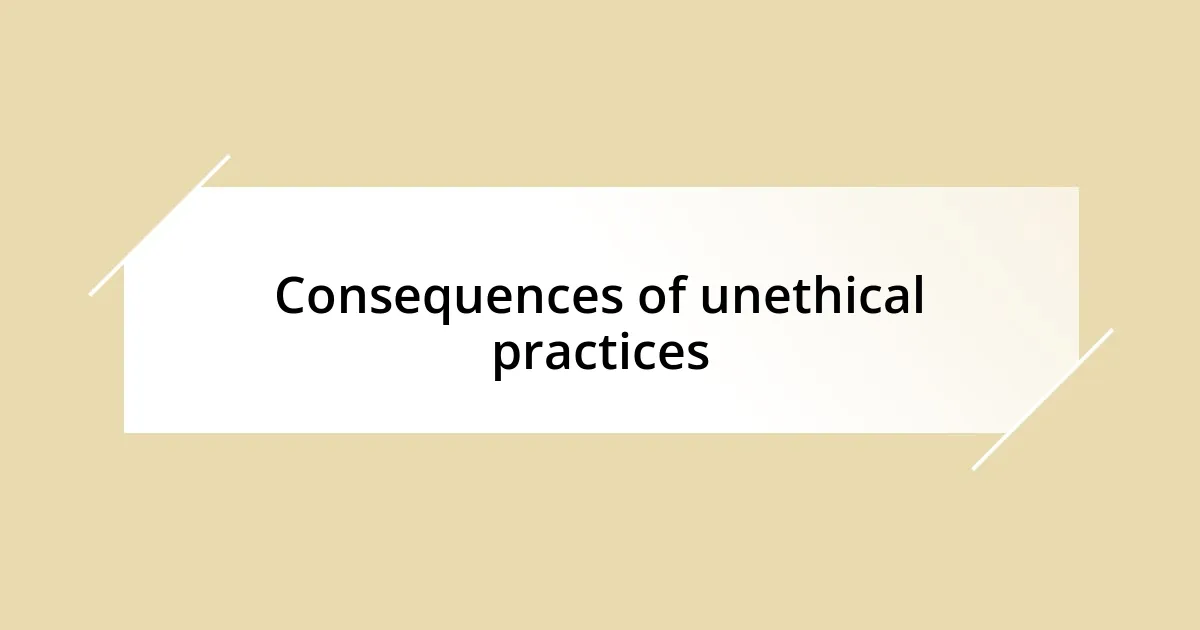
Consequences of unethical practices
Engaging in unethical practices can lead to a domino effect of negative consequences. I once witnessed a campaign that resorted to fabricating stories about opponents. It seemed like a clever tactic at first, but the fallout was devastating when the truth came out. Voter trust was shattered, and the campaign struggled to recover from that damage. What might feel like a shortcut can often translate into a long, winding road of distrust.
In my experience, the repercussions of unethical behavior extend beyond immediate voter disillusionment. I recall a candidate whose campaign was tainted by questionable fundraising tactics. The whispers of impropriety caused long-term supporters to abandon the cause, leading to a ghost of what could have been a vibrant movement. It made me ponder: how much can a candidate compromise their principles before they lose their identity? That loss of connection was palpable; it created an air of suspicion that hung over their entire campaign.
Ultimately, the damage to a campaign’s reputation is often irreparable. I remember discussing an election strategy where we considered pushing boundaries on negative campaigning. We quickly realized that such decisions could leave an indelible mark not just on our campaign but on our careers. The reality is, ethical missteps can follow candidates well beyond election day, affecting future endeavors and relationships. I learned that it’s wiser to build a foundation on ethical principles than to gamble with fleeting advantages.
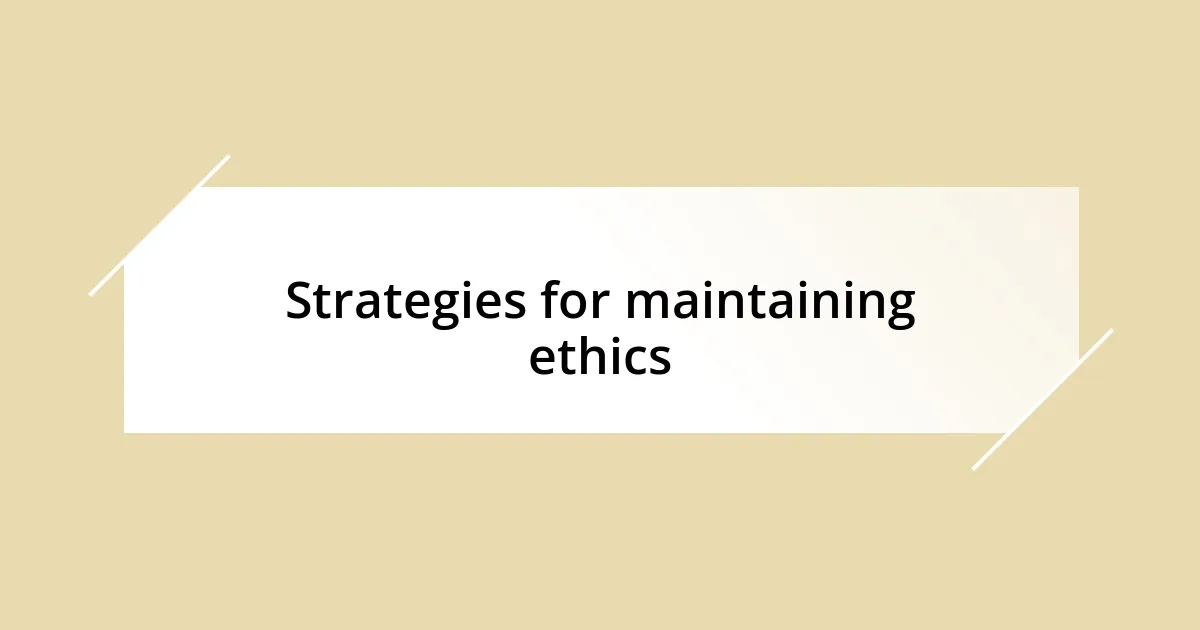
Strategies for maintaining ethics
To maintain ethics in political campaigns, strategic planning is essential. One effective approach I’ve found is to establish a clear set of ethical guidelines early on. This forms a moral compass for everyone involved, ensuring that when faced with tough decisions, the team has a reference point. I remember a time when we discussed the potential of bending the truth for persuasive storytelling. The conversation quickly turned to how those decisions could compromise not just the campaign’s integrity but our personal commitments to our values.
Another strategy I’ve embraced is regular reflection and open dialogues within the team. By fostering a culture of transparency, we not only encourage accountability but also invite diverse perspectives. I vividly recall a brainstorming session where a junior staff member raised concerns about a proposed advertisement’s veracity. Initially, I felt defensive, but upon reflection, I realized how vital it was to listen. It reminded me that each voice matters in upholding our ethical standards, transforming potential missteps into opportunities for growth and improvement.
Additionally, always considering the long-term impact of our actions can guide ethical decision-making. I often ponder: will this choice benefit the campaign now but harm it later? Once, I faced pressure to release a sensational press statement that could’ve attracted attention, but I hesitated. We ultimately opted for a message aligned with our core values. Not only did it preserve our credibility, but it also established a legacy that resonated with our constituents. Reflecting on experiences like these reinforces my belief that strategic ethical considerations can lead to meaningful, lasting connections with voters.
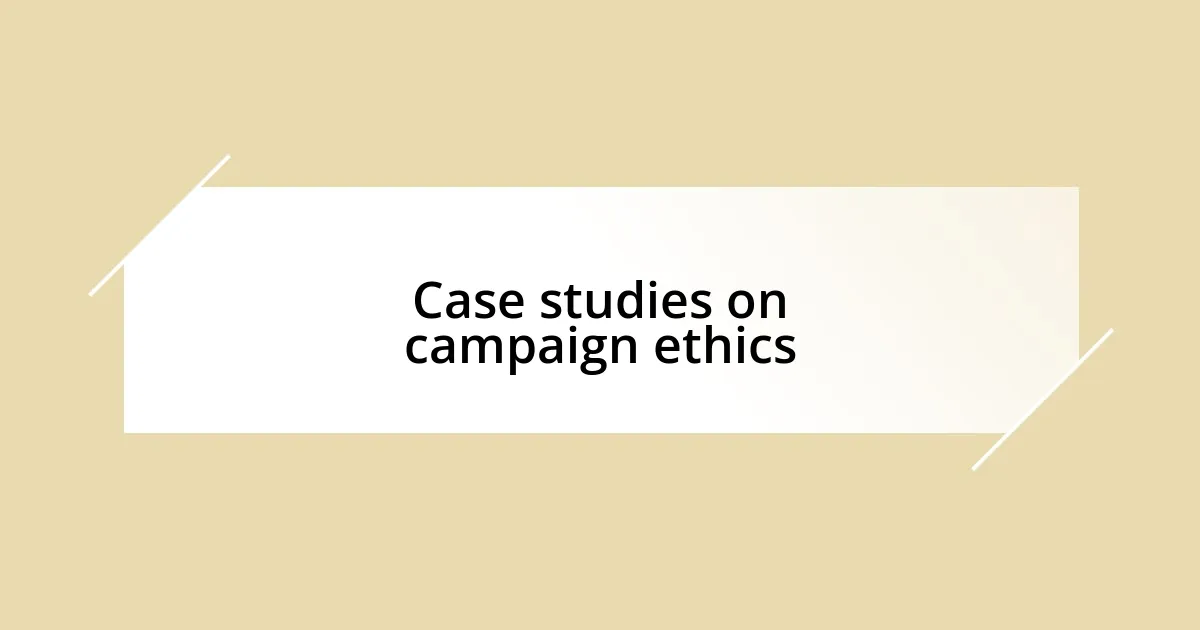
Case studies on campaign ethics
One of the most compelling case studies I’ve encountered revolves around a local campaign that faced a serious ethical dilemma with negative advertising. They had a choice between launching an aggressive attack ad or promoting their candidate’s strengths. I watched as the team weighed the options, ultimately deciding against the attack ad. This decision not only preserved their integrity but also sparked a wave of positive community engagement, demonstrating how ethical choices can foster deep voter connections.
In another instance, a campaign I was involved with took an unexpected turn when misinformation about their platform spread like wildfire on social media. It was a tough lesson in the impact of public perception and the responsibility that accompanies campaigning. Rather than retaliate, they chose to engage directly with voters, clarifying their stance and admitting where the miscommunication occurred. This openness not only diffused the situation but also built stronger trust with the electorate. Wouldn’t we all prefer to create a dialogue rather than a discord?
Lastly, I remember a campaign that became embroiled in a fundraising scandal due to a lack of transparency. The moment they were called out, it wasn’t just about losing donors; it began a trust fall with their entire base. I recall the palpable disappointment from supporters who felt betrayed. It genuinely eroded the campaign’s credibility and raised a critical question: how far can one stretch ethical boundaries before the campaign’s mission becomes unrecognizable? This scenario reinforced my belief that upfront honesty is not merely a strategy; it’s a necessity for safeguarding a campaign’s soul and nurturing long-term relationships with constituents.
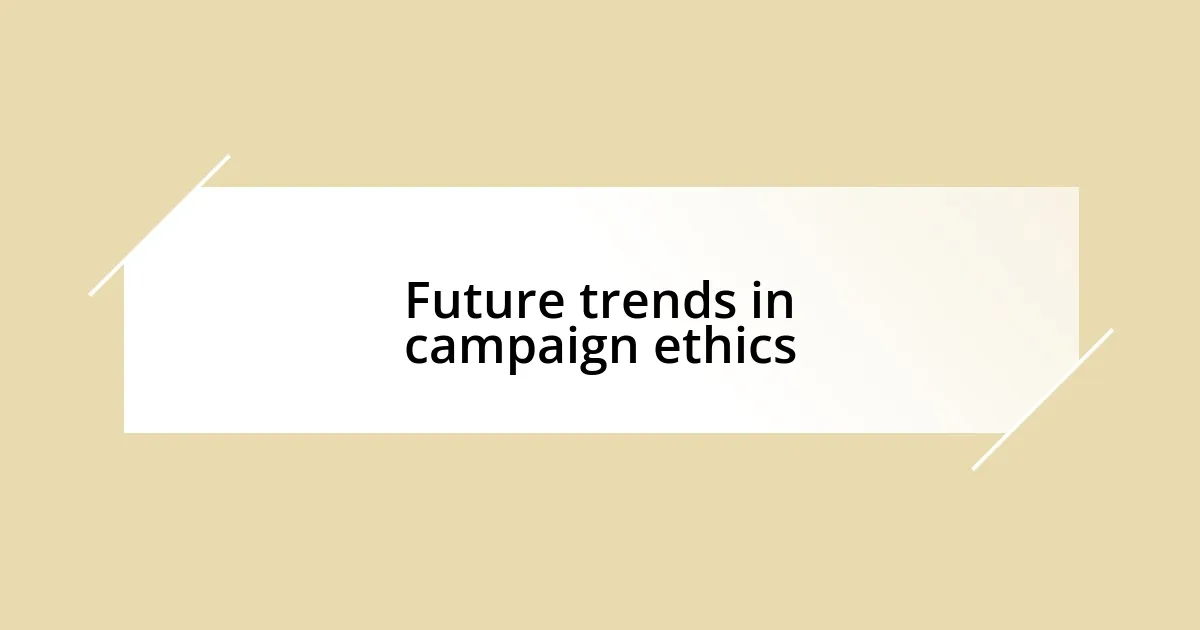
Future trends in campaign ethics
As we look ahead, it’s clear that technology will play a pivotal role in shaping campaign ethics. With the rise of artificial intelligence and data analytics, there’s a pressing need for campaigns to navigate the fine line between audience targeting and privacy invasion. I remember feeling uneasy during a campaign where we utilized data-driven strategies without fully considering the ethical implications. It raised questions: How much is too much when it comes to leveraging personal information? Engaging with this dilemma early on can help establish core values that prioritize voter respect.
Moreover, the increasing scrutiny on social media platforms is prompting campaigns to rethink their approaches. I’ve witnessed firsthand the repercussions of misinformation and how quickly it can spread. There was a point when a campaign I supported had to embark on a significant effort to correct false narratives about us. It made me realize that transparency isn’t just about what we say, but also about what we choose to omit. Are we really serving our constituents by avoiding tough truths? This evolving landscape demands that future campaigns adopt an ethical lens whenever crafting communications.
Lastly, I can’t help but feel optimistic about the growing call for accountability from both voters and advocacy groups. People are becoming more astute; they demand authenticity and ethical behavior from candidates. I reflect on my experiences in campaigns where we navigated public criticism regarding our choices – it was uncomfortable, but it led to meaningful conversations about our values. Isn’t it intriguing how adversity can actually rally a community around a stronger ethical foundation? As we move forward, it’s essential that campaigns embrace this scrutiny as an opportunity for growth and ethical commitment, rather than a mere challenge to overcome.






